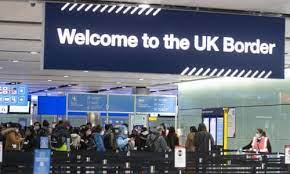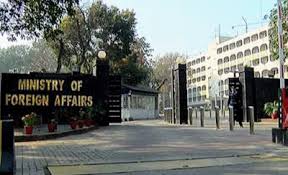Fivefold rise in number of EU citizens refused entry to UK since Brexit

London: The number of EU citizens refused entry to the UK since Brexit has increased fivefold, Home Office figures show.
In the first three quarters of 2019 just over 2,200 people from the EU were turned away at the border – compared with 11,600 in the first three quarters of 2023.
Since the last full year before the Covid lockdowns curtailed travel and the UK’s exit from the EU in 2020, the number of German nationals turned away has increased fivefold, from 80 in the whole of 2019 to 411 in the year ending September 2023. The number of French people turned away at the border has increased from 92 to 426 over the same period.
The data lays bare the impact of the end of free movement after Brexit but will also renew questions about the hostility shown by Border Force officials given the agreement between the EU and UK to allow six onth free travel for all citizens with a 90-day limit in an 180-day period for British citizens travelling to the continent.
Yesica Benitez, a graphic designer who is a Spanish citizen, told how she was detained at Luton airport after returning home to renew her passport.
She was apprehended by two border officials who asked if she was “coming to work in the UK illegally” despite her showing paperwork stating “this person is permitted to work subject to the restrictions in section 4” and the word “none” written in section 4 on the document.
“They treated me like I was stupid, that I was coming to work illegally. They told me my paperwork was not valid and I could not work. I had to keep showing them the words that said I am allowed to work,” she said.
“They were just so rude. Obviously I was showing them I knew my rights. I wasn’t being unpolite or anything. I was saying to them ‘I live in the UK. I am working right now and this is a document that says I can work.”
A female border official who did not believe her then called a colleague. “He took one look at my document and gave me my passport back and said I was free to go.”
Freedom for EU citizens to enter the UK to work, live, study or retire ended on 1 January 2021 as a result of Brexit. As part of the deal between the EU and UK limited short-term visits are allowed of up to 90 days in any 180-day period.
However, it emerged in summer 2021 that the discretion border officials had to refuse entry to EU citizens was being applied in a draconian manner with passengers locked up or expelled.
Many passengers admitted to being confused about the post-Brexit rules but were subjected to traumatic and humiliating experiences, with one Spanish woman sent to the Yarl’s Wood immigration detention centre for three days just because she thought she could come to the UK to apply for work.
After mounting criticism of the Home Office, revised guidance was given to the Border Force to issue immigration bail where appropriate rather than detention. Immigration bail would allow citizens to enter the country on the proviso they left within the required three months.
In October 2021 EU citizens were hit with another travel barrier after the UK government introduced a rule requiring passports rather than ID cards for travellers from the EU. However, those who were resident in the UK with settled or pre-settled status before Brexit can continue to use their ID card until at least the end of 2025.
Diplomats in Brussels say they have had repeated reports of border officials unaware of this exemption for EU citizens already residing in the country.
Romania is still the country with the highest number of citizens refused entry at ports and airports. In 2019 Border Force refused entry to 1,376 Romanians. In 2021, the year after Brexit, that jumped to just under 10,000 refusals, dropping to just under 8,000 in 2022.
In the year to September 2023 the numbers of Romanians refused entry fell to 5,683, a number that still dwarfs the amount of people turned away from any other EU country.
Bulgaria had the second highest increase of refusals since 2019, up from 143 refusals in 2019 to 1,345 in the year to September 2023.
The Home Office said “all passengers are treated with respect” adding it was ““Border Force’s number one priority is to keep our borders safe and secure, and we will never compromise on this”.
A spokesperson added: “Officers may stop any arriving passenger for the purposes of further examination where they are not immediately satisfied that they qualify for entry. This decision is taken based on the information that the passenger provides, not their nationality.”





